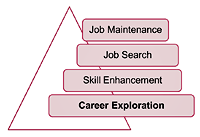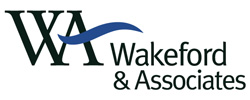 The Employability Dimensions model was developed by Human Resources and Skills Development Canada many years ago when it was still called Human Resources Development Canada. This model continues to be a good way to look at career management if you’re working, looking for work, changing fields or staying in the same field.
The Employability Dimensions model was developed by Human Resources and Skills Development Canada many years ago when it was still called Human Resources Development Canada. This model continues to be a good way to look at career management if you’re working, looking for work, changing fields or staying in the same field.
The Model
Career Exploration
Career exploration includes identifying, researching and evaluating your job options in addition to assessing your current skills. This step prepares you to make good career, job and training decisions. Career exploration is an ongoing process that can be done when you’re working and when you’re between jobs.
Skill Enhancement
Once you’ve made a decision about your career path, the next step involves matching the skills you have with the skills employers in the field need. Most employers will be willing to provide some training; however there will be skills they consider mandatory. Once you’ve identified the skills you need to develop, you can create a plan of action. This could involve self-study or in some cases you may need to complete a certificate, diploma or degree.
Job Search
When you’re confident in your ability to work in the field, you will be ready to start your job search. You will want to know about current job search techniques and have an up-to-date résumé that is targeted to the field. Finally, you will want to be prepared with strong interview skills.
Job Maintenance
Career management doesn’t end when you find a job. It involves taking steps to ensure you keep your current job, while preparing for new job opportunities. A few job maintenance tips: keep your résumé and references current, continue developing your skills and start a career portfolio to help you organize your career documents (e.g. performance evaluations, training certificates, job descriptions, awards, thank-you notes and letters of recommendation).
